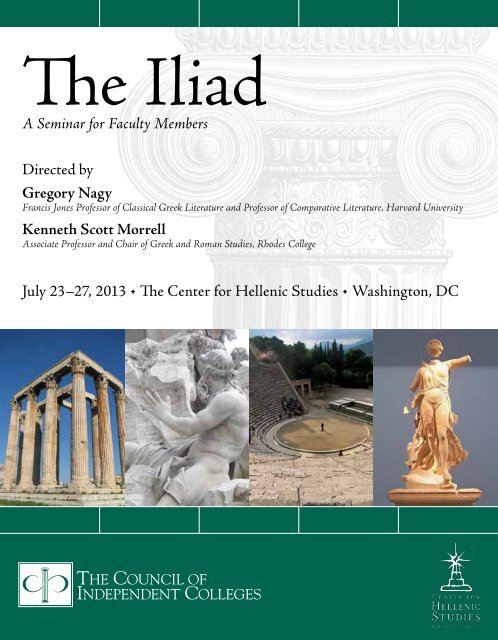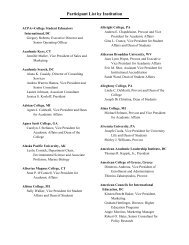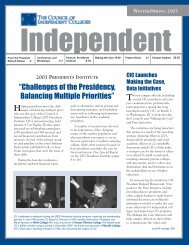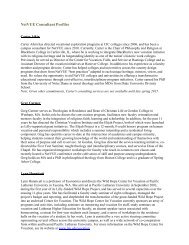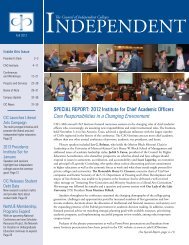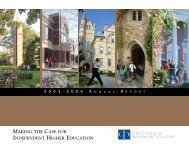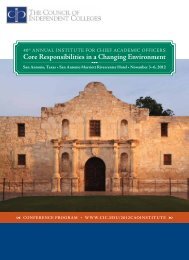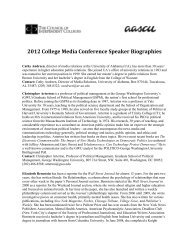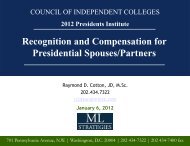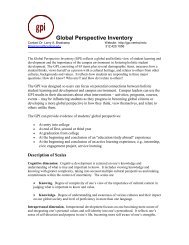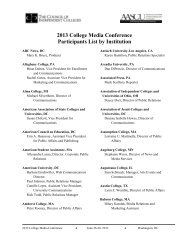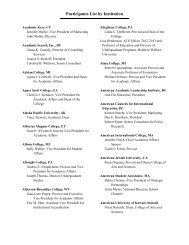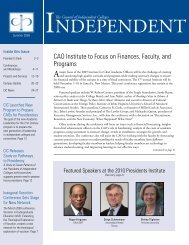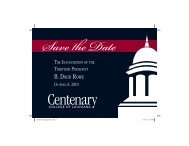The Iliad - The Council of Independent Colleges
The Iliad - The Council of Independent Colleges
The Iliad - The Council of Independent Colleges
You also want an ePaper? Increase the reach of your titles
YUMPU automatically turns print PDFs into web optimized ePapers that Google loves.
<strong>The</strong> <strong>Iliad</strong><br />
A Seminar for Faculty Members<br />
Directed by<br />
Gregory Nagy<br />
Francis Jones Pr<strong>of</strong>essor <strong>of</strong> Classical Greek Literature and Pr<strong>of</strong>essor <strong>of</strong> Comparative Literature, Harvard University<br />
Kenneth Scott Morrell<br />
Associate Pr<strong>of</strong>essor and Chair <strong>of</strong> Greek and Roman Studies, Rhodes College<br />
July 23–27, 2013 • <strong>The</strong> Center for Hellenic Studies • Washington, DC
<strong>The</strong> <strong>Iliad</strong><br />
Center for Hellenic Studies 4 July 23–27, 2013<br />
<strong>The</strong> seminar, designed for non-specialists, addresses the challenge <strong>of</strong> keeping alive<br />
in undergraduate education classical texts such as the <strong>Iliad</strong>, Odyssey, Homeric<br />
Hymns, poetry <strong>of</strong> Hesiod, and Histories <strong>of</strong> Herodotus that a generation ago were<br />
read and understood by every college graduate. Full-time faculty members in all<br />
disciplines at CIC member colleges and universities who might have occasion to use<br />
classical texts in their courses are encouraged to apply.<br />
Homeric poetry occupies a unique position in the evolution <strong>of</strong> ancient Mediterranean civilizations,<br />
playing a formative role in the development <strong>of</strong> epic in the Greco-Roman world. <strong>The</strong> study <strong>of</strong> this<br />
poetry requires a careful analysis <strong>of</strong> literary genres viewed in the historical contexts <strong>of</strong> performance<br />
traditions. Such traditions are conditioned by a wide variety <strong>of</strong> artistic, political, religious, and even<br />
economic conventions. Many <strong>of</strong> these conventions have found their way into our modern cultural<br />
contexts. This seminar will <strong>of</strong>fer an opportunity to examine the many dimensions <strong>of</strong> the <strong>Iliad</strong> in its<br />
various historical contexts and explore how the poem (to be read in translation) can be studied in<br />
courses that address a variety <strong>of</strong> literatures and disciplines. Participants will discuss diverse topics<br />
ranging from the exchange <strong>of</strong> luxury goods to the adjudication <strong>of</strong> disputes arising from athletic<br />
contests.<br />
Along with providing information and background for understanding Homeric poetry in its<br />
ancient contexts, the seminar will devote a substantial portion <strong>of</strong> each day to reading and analyzing<br />
the poem itself.<br />
On the first day participants will explore the “Homeric Questions”—that is, what is the role<br />
<strong>of</strong> an individual singer in an oral tradition; how did performances from an oral tradition become<br />
literary artifacts; and how did the various versions <strong>of</strong> the transcribed poem evolve into the text<br />
we commonly use today In addition, participants will discuss <strong>Iliad</strong> 1–2, which depicts the feud<br />
between Agamemnon and Achilles, Agamemnon’s dream, the omen and the snake and the birds,<br />
and preparations for battle, which include the catalogue <strong>of</strong> ships.<br />
<strong>The</strong> second day will begin with a brief overview <strong>of</strong> the relationship between Homeric studies and<br />
archaeological research on the material evidence that currently informs our understanding <strong>of</strong> the<br />
Bronze Age and the Archaic period as depicted in the <strong>Iliad</strong>. Discussions will then shift to the poem<br />
as participants examine <strong>Iliad</strong> 3–7, which includes the “τειχοσκοπία” (teikhoskopía, “the view from the<br />
wall”), the introduction <strong>of</strong> Helen, the duel between Menelaus and Paris, the wounding <strong>of</strong> Menelaus,<br />
Diomedes’ ἀριστεία (aristeía) and his moment <strong>of</strong> martial excellence, Hector’s return to the city and<br />
final meeting with Andromache, and the duel between Hector and Ajax.<br />
Cover images provided courtesy <strong>of</strong> Lanah Koelle and Allie Marbry <strong>of</strong> the Center for Hellenic Studies.
<strong>The</strong> third day will review responses to the <strong>Iliad</strong>—from the perspective <strong>of</strong> performance genres, such<br />
as lyric poetry and tragedy, which evolved after the disappearance <strong>of</strong> the oral tradition. Participants<br />
will then examine <strong>Iliad</strong> 8–10, which concerns the building <strong>of</strong> the wall, the embassy <strong>of</strong> Odysseus,<br />
Phoenix, Ajax to Achilles, and the nighttime raid <strong>of</strong> Odysseus and Diomedes on the camp <strong>of</strong> the<br />
Thracians. Next, participants will discuss <strong>Iliad</strong> 11–12, which focuses on Agamemnon’s turn as the<br />
preeminent warrior and the Trojans’ breach <strong>of</strong> the Greeks’ defensive wall.<br />
<strong>The</strong> fourth day will feature a discussion <strong>of</strong> the <strong>Iliad</strong> as a source <strong>of</strong> cultural paradigms, vignettes that<br />
served to illustrate moral dilemmas, appropriate and inappropriate modes <strong>of</strong> social interaction, and<br />
the relationship between certain characters and other elements <strong>of</strong> their immediate and more distant<br />
circumstances. Participants will look at how these exempla have migrated into other artistic media—<br />
including film. A discussion <strong>of</strong> developments in <strong>Iliad</strong> 13–15, when the fighting reaches the Greeks’<br />
ships, Hera distracts Zeus allowing the Greeks to repel the Trojans, and the Trojans counterattack,<br />
will be followed by <strong>Iliad</strong> 16–18, where the narrative focuses on the return <strong>of</strong> Patroklos to the fighting,<br />
his death, the fight to recover his body, and the armor Achilles receives to replace what Patroklos wore<br />
and lost to Hector.<br />
On the fifth day, participants will explore <strong>Iliad</strong> 19–24, featuring the return <strong>of</strong> Achilles to the<br />
fighting, his aristeía, the death <strong>of</strong> Hector, Priam’s trip to the Greek camp to recover his son’s body,<br />
their return to the city, and the mourning for Hector. <strong>The</strong> workshop will conclude with summative<br />
observations and assessment, followed by drinks and dinner.<br />
Gregory Nagy is the Francis Jones Pr<strong>of</strong>essor <strong>of</strong> Classical Greek Literature and<br />
pr<strong>of</strong>essor <strong>of</strong> comparative literature at Harvard University. He has served as chair<br />
<strong>of</strong> Harvard’s Literature Concentration, chair <strong>of</strong> the Department <strong>of</strong> the Classics,<br />
president <strong>of</strong> the American Philological Association (APA), and, since 2000,<br />
director <strong>of</strong> the Center for Hellenic Studies (CHS). His publications include<br />
<strong>The</strong> Best <strong>of</strong> the Achaeans: Concepts <strong>of</strong> the Hero in Archaic Greek Poetry, which<br />
won the APA’s Goodwin Award <strong>of</strong> Merit; Greek Mythology and Poetics; Pindar’s<br />
Homer: <strong>The</strong> Lyric Possession <strong>of</strong> an Epic Past; Poetry as Performance: Homer and<br />
Beyond; Homeric Questions; Plato’s Rhapsody and Homer’s Music: <strong>The</strong> Poetics <strong>of</strong> the Panathenaic Festival<br />
in Classical Athens; and Homeric Responses. In spring 2002, he delivered the Sather Lectures at the<br />
University <strong>of</strong> California, Berkeley, on “Homer the Classic.”<br />
Kenneth Scott Morrell is associate pr<strong>of</strong>essor and chair <strong>of</strong> Greek and Roman<br />
Studies at Rhodes College in Memphis, Tennessee, and is director <strong>of</strong> outreach<br />
at CHS. In addition to publishing and teaching on ancient Greek and Latin<br />
literature, he has participated in an archaeological survey in southwestern<br />
Turkey and been active in a variety <strong>of</strong> initiatives related to the use <strong>of</strong> information<br />
technology. He was an original member <strong>of</strong> the Perseus Project and has more<br />
recently been involved with Sunoikisis (http://sunoikisis.org) and the Collaboratory<br />
for GIS and Mediterranean Archaeology (CGMA) Project (cgma.depauw.edu).
Participants, Location, and Expenses<br />
Up to 20 individuals will be selected by competitive nomination. Participants must be full-time<br />
faculty members at CIC member institutions and can be in any field or department. <strong>The</strong> seminar will<br />
take place at CHS in Washington, DC. Housing will be provided at the Center. Rooms, most meals,<br />
books, and other expenses will be covered by CIC, CHS, and the Andrew W. Mellon Foundation. <strong>The</strong><br />
only expense to participants or their institutions will be transportation to and from Washington, DC,<br />
although CIC will <strong>of</strong>fer reimbursements <strong>of</strong> up to $200 for travel expenses.<br />
Nomination Process<br />
<strong>The</strong> chief academic <strong>of</strong>ficer <strong>of</strong> the nominee’s institution must nominate the faculty member who wishes<br />
to participate. Each institution may nominate more than one individual, and faculty members <strong>of</strong> all<br />
academic ranks are eligible to participate. <strong>The</strong> seminar is open to individuals who have participated in<br />
previous CIC/CHS seminars, but preference will be given to first-time participants. <strong>The</strong> nomination<br />
instructions and form are available online at www.cic.edu/AncientGreece and may be submitted by mail<br />
or online. Each nomination package should consist <strong>of</strong> the following:<br />
1. Nomination letter from the chief academic <strong>of</strong>ficer;<br />
2. Completed nomination form;<br />
3. Nominee’s curriculum vitae; and<br />
4. Nominee’s statement <strong>of</strong> reasons for wishing to participate in the seminar and <strong>of</strong> anticipated<br />
outcomes (no more than one page).<br />
Nomination Deadline<br />
Please send the completed nomination in a single package to CIC by Friday, February 1, 2013.<br />
Selection <strong>of</strong> Participants Announced: Friday, March 1, 2013<br />
Submit Nominations<br />
Materials to:<br />
Stephen Gibson<br />
Director <strong>of</strong> Programs<br />
<strong>Council</strong> <strong>of</strong> <strong>Independent</strong> <strong>Colleges</strong><br />
One Dupont Circle, NW, Suite 320<br />
Washington, DC 20036-1142<br />
Phone: (202) 466-7230<br />
Email: sgibson@cic.nche.edu<br />
www.cic.edu/AncientGreece<br />
<strong>The</strong> seminar is held on the Center for Hellenic<br />
Studies’ campus in Washington, DC.<br />
XX%<br />
Cert no. XXX-XXX-000


